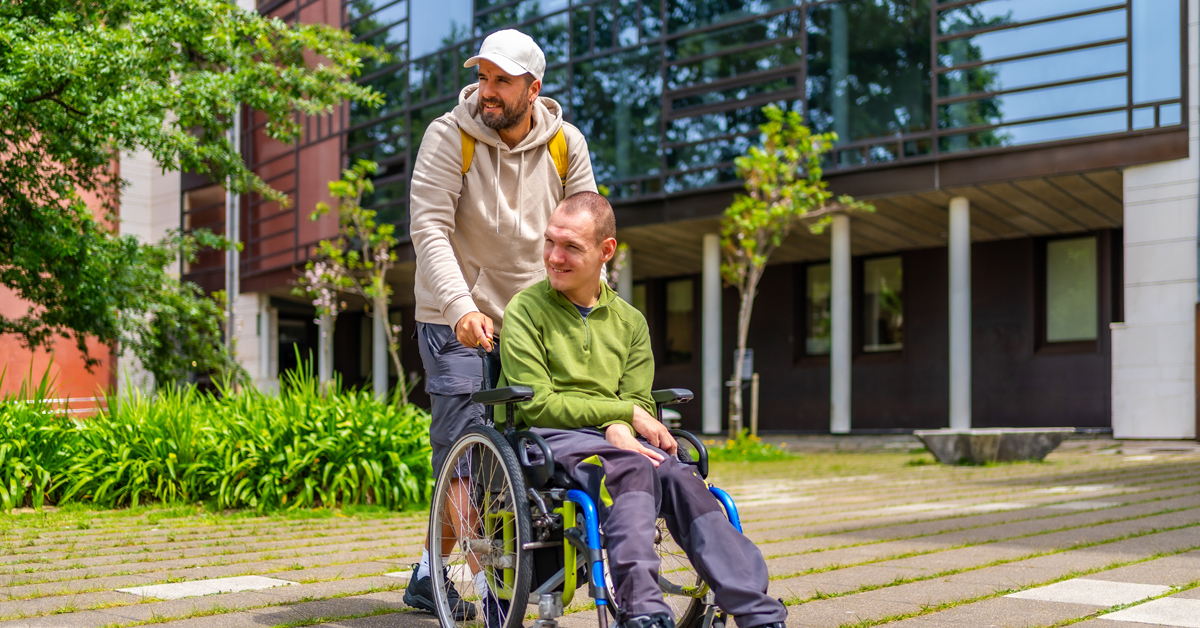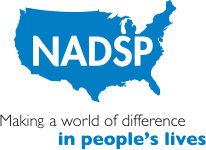
Supporting Community Access In Light Of The ADA Anniversary
The following article is part of an ongoing series about the NADSP Competency Areas. The NADSP Competency Areas offer DSPs the opportunity to address challenges, work on issues identified by the person they support, or assist a person in pursuing a particular goal. Each Competency Area has corresponding skill statements that describe the knowledge and skills DSPs must have to demonstrate competency in each area.
This blog is about the skill statement “The competent DSP ensures participant access to needed and available community resources coordinating supports across agencies,” within the NADSP Competency Area: “Community and Service Networking.”
Inside The Competency Area
Community and Service Networking
The direct support professional (DSP) whose responsibilities extend beyond direct personal assistance must also include a commitment to facilitating meaningful lives and opportunities for inclusion within the community. Community and Service Networking is a particularly crucial competency for professionals to embrace. This competency stipulates that a proficient DSP ensures individuals have access to necessary and available community resources and effectively coordinates support services across various agencies.
We will explore the critical dimensions of this competency, examining how DSPs serve as essential gatekeepers, connecting individuals to the elements of their communities and how they orchestrate networks of services to foster independence, well-being, and full community participation.
The competent DSP ensures participant access to needed and available community resources coordinating supports across agencies.
Inside The Skill Statement
The competent DSP ensures participant access to needed and available community resources coordinating supports across agencies.
Supporting individuals with disabilities has had a significant shift, transitioning from segregated institutional models to the model that prioritizes community inclusion, self-determination, and person-centered thinking and planning. Community and Service Networking acknowledges that inclusion for individuals with disabilities is based on active engagement with the broader community, rather than just living within it.
For a DSP, this involves possessing an in-depth understanding of local resources, comprehending the variety of service providers, and skillfully navigating these systems on behalf of the individuals they support. The foundational premise of this competency is deeply rooted in the principles of self-determination and quality of life. Individuals with disabilities, like all members of society, derive substantial benefits from access to diverse opportunities for recreation, education, employment, healthcare, and social interaction.
The Impact On People Receiving Services
Without a DSP who is adept at community and service networking, individuals risk isolation, limited opportunities, and fragmented support, thereby undermining their potential for personal growth and independence. The competent DSP recognizes that their role is not to construct a separate environment for the individual, but rather to empower them to flourish within the existing, dynamic excitement of community life.
When a DSP has a commitment to the person-centered planning process, it ensures that all community and service networking – and all DSPs coordination efforts – are directly in step with the individual’s unique vision for their life. By connecting individuals to these vital resources and meticulously coordinating supports across a diverse landscape of agencies, the NADSP Competency of Community and Service Networking is a cornerstone of person-centered support. The competent DSP is an indispensable navigator, an informed advocate, and a skilled coordinator, who actively ensures that people with disabilities can be empowered to lead more independent, connected, and fulfilling lives.
People with disabilities must have meaningful access to the vast array of resources and opportunities available in their communities. A DSP’s dedication to fostering genuine community inclusion transforms the promise of community living into a tangible reality, affirming the inherent value and potential of every individual.
Putting It All Into Practice
Ensuring participant access to needed and available community resources is a dynamic and highly individualized process. It commences with a thorough, person-centered assessment of the individual’s unique aspirations, needs, strengths, and preferences. A proficient DSP does not merely provide a generic list of community options; instead, they engage in a rich dialogue with the individual, and also their family or guardians, to identify specific objectives.
For instance, if an individual expresses an interest in art, the DSP would research local art classes, community centers offering art workshops, or volunteer opportunities at art galleries. This identification phase is all about proactive investigation, often involving online research, networking with other professionals, attending community events, and even visits to prospective resources to evaluate accessibility and suitability.
Once potential resources are identified, the DSP plays a major role in informing the individual about the options in an accessible and comprehensible manner, utilizing communication methods tailored to a person’s specific needs. This may involve visual aids, simplified language, or repeated explanations to ensure informed decision-making. Ethical considerations, particularly regarding confidentiality and informed consent, must consistently guide the DSP’s actions when sharing information or connecting individuals to new services in community based settings. Too often, people with disabilities are not given the respect and dignity of discretion and confidentiality in comparison to those seeking community access who do not have disabilities.
The DSP must also actively facilitate access. This often includes practical steps such as assisting with application procedures, completing documentation, scheduling appointments, and arranging or providing transportation. For many individuals, navigating unfamiliar environments can be difficult. The DSP functions as a guide and advocate, accompanying individuals to initial visits, assisting them in understanding new settings, and advocating for necessary accommodations to ensure full participation. This hands-on support is crucial in overcoming common barriers to community integration, like financial constraints, physical accessibility challenges, communication difficulties, or discrimination.
The competent DSP will employ creative problem-solving, seeking out accessible transportation options, exploring funding avenues, challenging discriminatory practices, and fostering positive interactions between the individual and community members. Their presence and support can transform a potentially overwhelming experience into an empowering one, enhancing the individual’s confidence and sense of belonging.
Quick Tips
How can you help embrace this skill statement and implement it? Here are some quick tips!
-
- Know your community and the people who can help.
- Find out what the people you support REALLY want to experience in their neighborhood and community.
- Speak to your supervisors and employer to encourage and allow you as a DSP, to explore and learn about the neighborhood and community
- Get connected to community resources yourself – get a library card, park access card, mass transit or local transit access card/app.
- Take advantage of seasonal and community events that are free, such as concerts, farmer’s markets, festivals, etc.
NADSP Competency Areas
The NADSP Competency Areas offer DSPs the opportunity to address challenges, work on issues identified by the person they support, or assist someone in pursuing a goal.
You May Also Be Interested In …

Let’s Talk: Beyond Companionship: How Dogs Support People To Thrive

Let’s Talk: The Art of Connection: Establishing and Repairing Rapport in Direct Support Settings

Let’s Talk: Summertime and The Living Should Be Easy: Supporting People with Significant Intellectual and Developmental Disabilities in Summer Activities

Let’s Talk: Embracing Diversity Equity and Inclusion: A Pathway to Professional Excellence for DSPs

Let’s Talk: Burnout: Reclaiming Mental Wellness in Direct Support Work

Let’s Talk: Flipping the Switch: Compassion Fatigue to Compassion Satisfaction and Psychological Safety for Direct Support Professionals

Let’s Talk: Sexuality and Healthy Relationship Knowledge is Power

Let’s Talk: Balancing Joy, Boundaries, and Belonging: The Ethical Role of DSPs in Holiday Celebration and Connection

Webinar: The Future of COVID-19 and Vaccines

